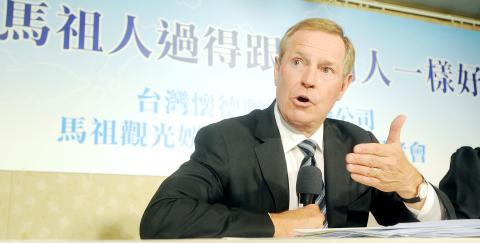Weidner Resorts Taiwan, a company run by Venetian Casino Resort chief executive Bill Weidner, said yesterday it planned to invest about NT$60 billion (US$2 billion) to build a casino resort on the Matsu archipelago and upgrade airports and other infrastructure necessary to realize the project.
“As a gaming expert, I’m confident of turning Matsu into a successful casino resort after those we built in Macau and Singapore,” Weidner told a media briefing in Taipei.
He urged the legislature to speed up casino legislation, in line with the wishes of the majority of Matsu residents.

Photo: Lin Cheng-kung, Taipei Times
Weidner, former chief operating officer of Las Vegas Sands Corp, made the plea after Matsu residents on Saturday voted in a referendum in favor of allowing casino resorts to boost economic development on the outlying island group.
Weidner said his company would spend NT$12 billion upgrading the airport in Beigan (北竿) from its current 2C classification to 3C, so that it would be able to accommodate larger aircraft and have fewer abortive flights caused by seasonal thick fog.
“I don’t see any problems that cannot be solved by modern technology,” he said.
Weidner Resorts Taiwan, which would have to win the bid for the development project once the legislature gives its go-ahead, aims to spend NT$30 billion establishing a giant casino resort with 2,000 hotel rooms, shopping malls, international conference centers, theme parks and other recreational facilities, Weidner said.
The planned investment would provide between 3,500 and 5,000 permanent jobs, in addition to work opportunities in transportation and related sectors, he said.
The developer also plans to build a university with a focus on cultivating talent in the hospitality industry and studying cross-strait relations, at a budget of NT$3 billion, Weidner said.
Weidner, whose company helped pitch the gaming referendum, said the resort would draw millions of visitors from Taiwan proper and China’s coastal cities such as Wenzhou and Fuzhou.
“Taiwanese make 1.2 million visits to Macau and contribute between NT$600 million and NT$900 million in tourism revenue” to the Chinese Special -Administrative -Region a year,” he said. “That money could stay in Taiwan if it had its own casino resort.”
Matsu residents could enjoy generous benefits, including tax and other compensation equivalent to NT$80,000 per month per person if the casino resort meets growth targets as forecast, Weidner said.
Weidner, who failed in pushing through a casino referendum in Penghu years ago, said he would be patient, but added he could not wait forever.
“I would say one year is reasonable, but that doesn’t mean the company will pull out if the legislation takes longer,” he said. “We cannot wait forever. There are other investment opportunities elsewhere.”
Only 5 percent of the planned resort would be devoted to gaming facilities, Weidner added.

MULTIFACETED: A task force has analyzed possible scenarios and created responses to assist domestic industries in dealing with US tariffs, the economics minister said The Executive Yuan is tomorrow to announce countermeasures to US President Donald Trump’s planned reciprocal tariffs, although the details of the plan would not be made public until Monday next week, Minister of Economic Affairs J.W. Kuo (郭智輝) said yesterday. The Cabinet established an economic and trade task force in November last year to deal with US trade and tariff related issues, Kuo told reporters outside the legislature in Taipei. The task force has been analyzing and evaluating all kinds of scenarios to identify suitable responses and determine how best to assist domestic industries in managing the effects of Trump’s tariffs, he

TIGHT-LIPPED: UMC said it had no merger plans at the moment, after Nikkei Asia reported that the firm and GlobalFoundries were considering restarting merger talks United Microelectronics Corp (UMC, 聯電), the world’s No. 4 contract chipmaker, yesterday launched a new US$5 billion 12-inch chip factory in Singapore as part of its latest effort to diversify its manufacturing footprint amid growing geopolitical risks. The new factory, adjacent to UMC’s existing Singapore fab in the Pasir Res Wafer Fab Park, is scheduled to enter volume production next year, utilizing mature 22-nanometer and 28-nanometer process technologies, UMC said in a statement. The company plans to invest US$5 billion during the first phase of the new fab, which would have an installed capacity of 30,000 12-inch wafers per month, it said. The

Taiwan’s official purchasing managers’ index (PMI) last month rose 0.2 percentage points to 54.2, in a second consecutive month of expansion, thanks to front-loading demand intended to avoid potential US tariff hikes, the Chung-Hua Institution for Economic Research (CIER, 中華經濟研究院) said yesterday. While short-term demand appeared robust, uncertainties rose due to US President Donald Trump’s unpredictable trade policy, CIER president Lien Hsien-ming (連賢明) told a news conference in Taipei. Taiwan’s economy this year would be characterized by high-level fluctuations and the volatility would be wilder than most expect, Lien said Demand for electronics, particularly semiconductors, continues to benefit from US technology giants’ effort

‘SWASTICAR’: Tesla CEO Elon Musk’s close association with Donald Trump has prompted opponents to brand him a ‘Nazi’ and resulted in a dramatic drop in sales Demonstrators descended on Tesla Inc dealerships across the US, and in Europe and Canada on Saturday to protest company chief Elon Musk, who has amassed extraordinary power as a top adviser to US President Donald Trump. Waving signs with messages such as “Musk is stealing our money” and “Reclaim our country,” the protests largely took place peacefully following fiery episodes of vandalism on Tesla vehicles, dealerships and other facilities in recent weeks that US officials have denounced as terrorism. Hundreds rallied on Saturday outside the Tesla dealership in Manhattan. Some blasted Musk, the world’s richest man, while others demanded the shuttering of his